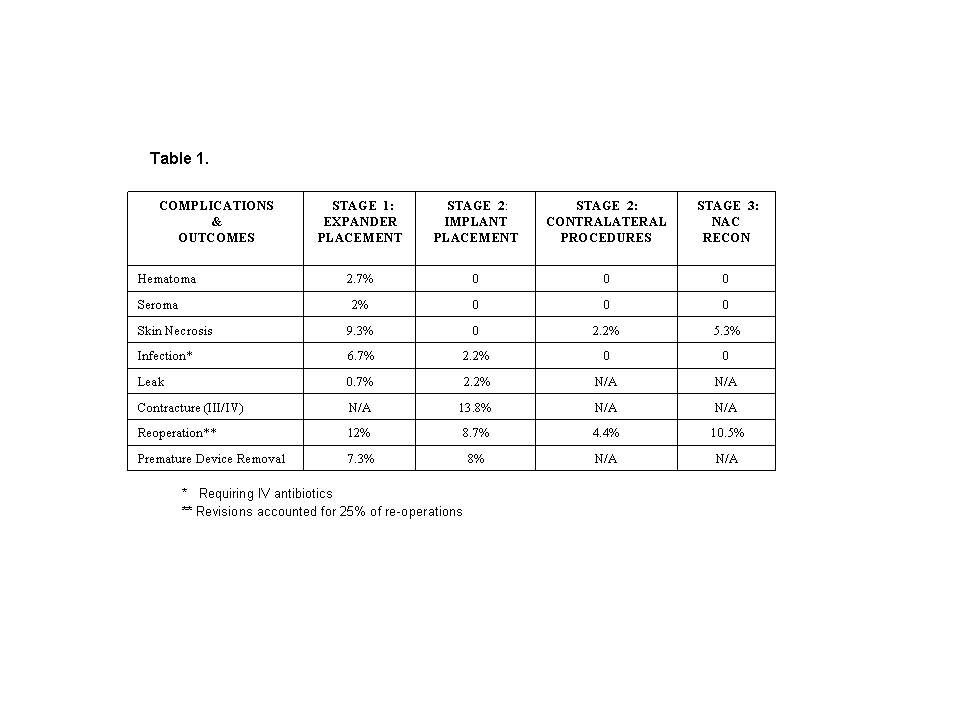McCormick Place, Lakeside Center
Sunday, September 25, 2005
9:00 AM - 5:00 PM
McCormick Place, Lakeside Center
Monday, September 26, 2005
9:00 AM - 5:00 PM
McCormick Place, Lakeside Center
Tuesday, September 27, 2005
9:00 AM - 5:00 PM
McCormick Place, Lakeside Center
Wednesday, September 28, 2005
9:00 AM - 5:00 PM
7955
Implant Based Breast Reconstruction in Elderly Women: Advantages and Outcomes
Purpose:
Almost half of all breast cancer patients in the United States are greater than 65 years of age. Although the majority survives their cancer more than 10 years, breast reconstruction is performed less frequently in older women. It is unclear whether this represents patient preference or physician bias. Few publications address breast reconstruction in the elderly and those that do tend to be small series with varying complication rates that encompass all forms of reconstruction. The objective of this study was to review a single cancer center's 12 year experience with implant based breast reconstruction in this age group.
Methods:
A retrospective study of all mastectomy patients aged 65 and older who underwent two-stage tissue expander (TE) and implant breast reconstruction between April 1993 and December 2004 was performed. Parameters evaluated included: timing and laterality of reconstruction, chemotherapy, radiation, medical and smoking history, length of operation, incidences of balancing procedures and nipple-areolar (NAC) reconstruction, hospital stay and time to complete reconstruction. Complications and outcomes were analyzed.
Results:
The total number of mastectomies performed in women aged 65 and older during this time period was 1414. In 132 (9%) of these patients, reconstruction was performed. A total of 150 tissue expanders (92% immediate, 86% unilateral) and 138 implants (85% saline) were placed. Mean age was 69 (range 65-80) with a mean follow-up of 37 months (range 2-120). Chemotherapy was administered to 35% of patients and 20% received radiation. A 70% incidence of preoperative comorbid conditions was noted. Operative time for mastectomy and tissue expander insertion averaged 208 minutes (bilateral: 270) and delayed procedures 112 minutes. Permanent implant exchange averaged 105 minutes (bilateral: 155). Contralateral symmetry procedures were performed on 50% and 18% chose NAC reconstruction. Average hospital admission for reconstruction was 2.8 days. Mean interval to completion of reconstruction was 222 days (range 58-685).
There was only one major medical complication (pulmonary embolus) and no mortalities. Overall, 88% of reconstructions were successful. On multivariate analysis, no patient characteristic or comorbid condition was significantly associated with reconstruction failure. Complications and outcomes are listed in Table 1.
Conclusions:
Two-stage implant breast reconstruction is a safe and effective option for the elderly patient. Anesthetic times and hospital stays are acceptably brief. Most complications are minor and occur more frequently after TE insertion than with implant exchange. The majority of early complications are related to mastectomy flap necrosis or infection. In spite of a high incidence of comorbid conditions, the vast majority of patients underwent uncomplicated, successful reconstruction.
View Synopsis (.doc format, 65.0 kb)

